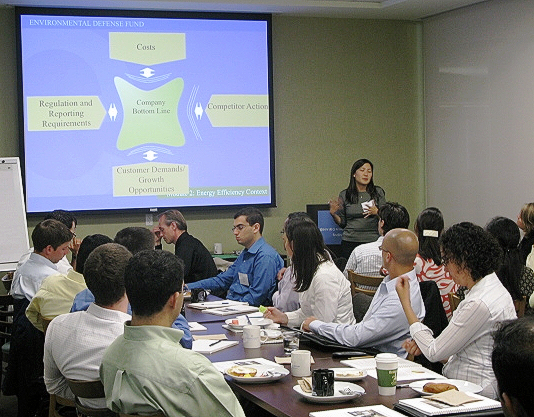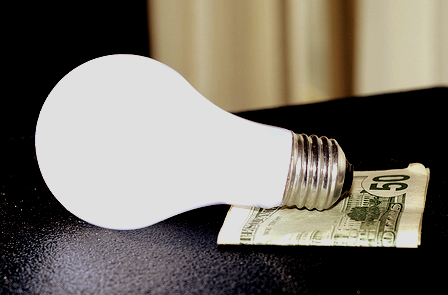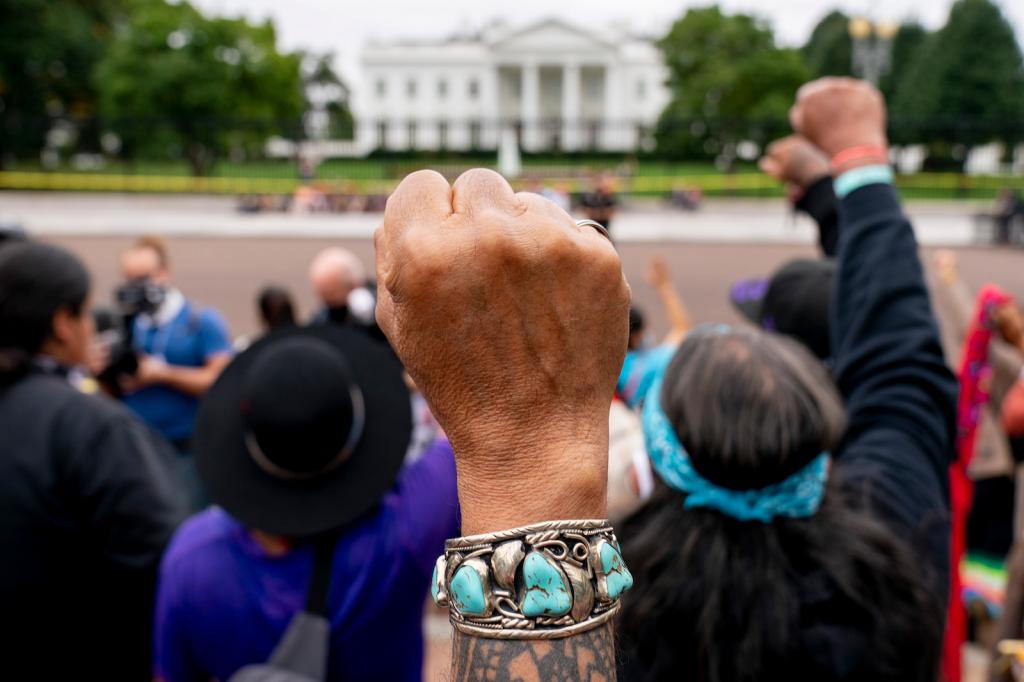On the 28th floor of a San Francisco skyscraper, a cadre of 26 young men and women called the Climate Corps is being briefed. They won’t be planting trees or serving as Al Gore’s cap-and-trade shock troops.
Rather, these are MBAs on a mission to infiltrate the Fortune 500 and help them save … money (and the planet too) by rooting out energy inefficiency and developing strategies to cut corporate carbon budgets.
The Climate Corps is an internship project of the Environmental Defense Fund, and I’m at EDF’s San Francisco outpost as a three-day boot camp gets underway to train these green MBAs in such things as “HVAC Technologies and Efficiency Approaches” and “Energy Efficiency Option Identification & Evaluation Process.” (And yes, they stayed wide-awake during those presentations.)
Once the interns are “embedded” at Cisco, Hewlett-Packard and 21 other companies for the summer, they’ll go to work assessing ways to cut power consumption at data centers, corporate HQs and other facilities while doing the math to justify energy efficiency investments for the bean counters.
“The thing that is most exciting about what you’re doing is the opportunity that you have to be the catalyst for change in the companies that you go to,” Elizabeth Sturcken, EDF’s managing director for corporate partnerships, tells the troops. “Some of these companies get it and others, they’re trying to get it and that’s why you’re there.”
The nuts and bolts of energy efficiency can be mind-numbing — just sit through the “Lighting Lifecycle Cost Calculation” session — but the bottom-line numbers are jolting: Office buildings in the United States account for as much greenhouse gas emissions annually as 43 coal-fired power plants, according to the Department of Energy. Corporations, meanwhile, spend $108 billion a year on their energy bills.
During the Climate Corps’ inaugural run last summer, seven interns indentified $35 million in energy efficiency savings at their companies, EDF says.
 Members of the Climate Corps’ 2009 class of interns listen to a presentation from EDF’s Millie Chu Baird.Courtesy of Environmental Defense FundWhich begs the question: why don’t these wealthy corporations hire their own corps of energy efficiency experts?
Members of the Climate Corps’ 2009 class of interns listen to a presentation from EDF’s Millie Chu Baird.Courtesy of Environmental Defense FundWhich begs the question: why don’t these wealthy corporations hire their own corps of energy efficiency experts?
Easier said than done, says Millie Chu Baird, the Climate Corps’ project director. “We found there are a number of organizational and institutional barriers that prevent companies from embracing energy efficiency investments.”
Mainly, the guys who keep the lights on don’t talk to the gals who pay the bills, and no one wants to make more work for themselves or ask for money for capital improvements, especially at a time when the global economy it teetering.
Enter the tech-savvy MBA with dark green eyeshades who can bridge the gap between the two worlds. Half this year’s Climate Corps members are trained engineers who didn’t sweat solving boot camp exercises like, “How many gallons of gasoline equivalent would be saved every year by replacing a 60W incandescent light bulb running 4,000 hours with a CFL?”
“We thought why not MBA interns, future leaders?” says Baird “We can indoctrinate them and train them and they themselves can show companies that being good for the environment is good for the bottom line.”
A green fifth column, in other words.
It may be a harbinger of a cultural shift that these once-future masters of the universe from A-list B-schools at Stanford, Yale and Columbia are choosing to put their financial smarts to work saving the universe — while making a buck, of course.
“The sustainable finance class is really popular,” says Ryan Whisnant, who’s getting dual degrees from the University of Michigan business school and the school of natural resources. “People think it’s really a strategic advantage to have an understanding of sustainability.”
Whisnant will be embedded at the Wayne, Penn., headquarters of SunGard — a $5.5 billion software and IT services company — where he’ll work on carbon foot-printing the corporate campus.
Jennifer Sweet, SunGard’s senior manager for corporate responsibility, says she jumped at the chance to take on an intern dedicated to energy efficiency, especially one like Whisnant, who has a degree in environmental engineering. Like the other companies in the Climate Corps program, SunGard will pay Whisnant’s salary during the internship.
That’s a sweet deal for Sweet. “This is the kind of consultant that would cost $80,000 to $100,000 for three months,” she says.
“This is a phenomenal opportunity to get an idea of what we need to do and spread that to all our other offices,” adds Sweet, who is the sole full-time employee among SunGard’s 21,000-person workforce dedicated to sustainability issues. “Sustainability is really pushed heavily from our CEO and our board and from the grassroots,” she says. “Hopefully, we’ll be pushing the center to get the operations mangers to make changes.”
Last summer, Emily Reyna was one of 15 MBA candidates dispatched to Silicon Valley networking giant Cisco Systems by the University of Michigan, but she was the only one working on energy efficiency. She spent her internship devising ways for Cisco’s R&D laboratories to cut their energy use.
She discovered that a Cisco lab in North Carolina had installed intelligent power strips to turn off equipment when idle, resulting in a 25 percent cut in electricity consumption. She spent the summer talking to lab managers and studying the financial implications of rolling out the devices to all of Cisco’s 1,000+ labs.
“As an MBA going in, you’re working with facilities people or energy managers and they don’t think you’re credible,” say Reyna. “But being able to really dig into the numbers and make the case is what’s valuable about the program because they often don’t have time do it.”
A Climate Corps MBA candidate from the University of Michigan will continue her work this summer, Reyna says, as Cisco launches a pilot project to test the power-saving gadgets at three labs.
—
Watch a short EDF promotional video about the Climate Corps program:



